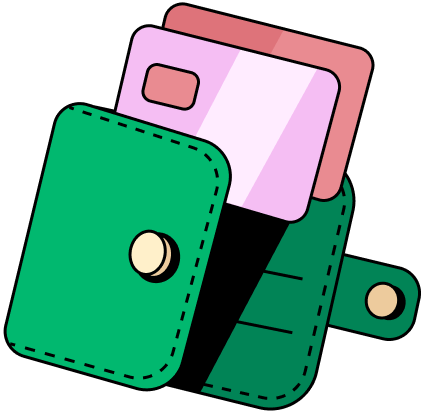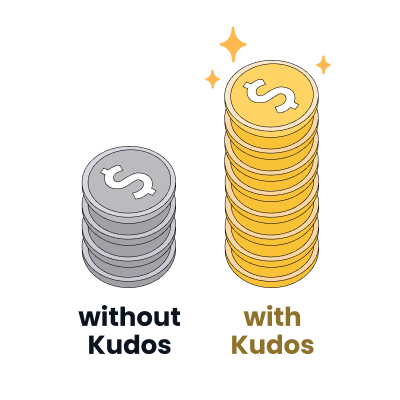
Kudos has partnered with CardRatings and Red Ventures for our coverage of credit card products. Kudos, CardRatings, and Red Ventures may receive a commission from card issuers. Kudos may receive commission from card issuers. Some of the card offers that appear on Kudos are from advertisers and may impact how and where card products appear on the site. Kudos tries to include as many card companies and offers as we are aware of, including offers from issuers that don't pay us, but we may not cover all card companies or all available card offers. You don't have to use our links, but we're grateful when you do!
Can You Pay Your Taxes with a Credit Card?


As tax season approaches, many of us are looking for the most efficient ways to pay Uncle Sam if we owe money to the government. There are several ways you can pay your tax bill, and one of the easiest ways is using a credit card, which has gained in popularity over the years. Paying with a credit card that earns rewards offers convenience and also nets you points, miles, or cashback. It’s not without its drawbacks though. Here are the pros and cons of paying your tax bill with a credit card.
Pros of Paying Taxes with a Credit Card
1. Convenience and Flexibility
Paying taxes with a credit card is straightforward and can be done online, which makes it a convenient option. It allows for last-minute payments, helping taxpayers avoid late fees associated with missing the tax payment deadline.
2. Earn Rewards, Points, or Cash Back
Many credit cards offer rewards, points, or cash back on purchases. If your card offers rewards, paying a large tax bill can help you rack up significant rewards, which can then be used for travel redemptions, shopping, or to pay down future bills. How much you'll earn depends on the card you use and the size of your tax bill. If you have a $1,000 tax bill and earn 1 reward point per dollar spent, that's 1,000 reward points right there.
3. Meeting Spending Requirements for Bonuses
If you’re trying to meet a minimum spending requirement to earn a sign-up bonus on a new credit card, or you get special incentives when you put a certain amount of spend on your card, paying your taxes will help you reach that threshold more quickly.
4. Cash Flow Management
Using a credit card can help manage cash flow by giving you extra time to pay off the tax bill. If you're expecting income or funds shortly but don't have enough cash to cover taxes now, charging it to your credit card will bridge the gap and buy you time. Even sweeter: using a card with a 0% introductory annual percentage rate (APR) will help you avoid interest charges you'd face with other cards, too. If you're able to pay back the full amount you owe before the 0% APR period ends, you won't owe any extra.
Some of the best cards currently offering long 0% APR periods are:
- Chase Freedom Unlimited® - 0% intro APR on purchases and Balance Transfers for 15 months
- Capital One SavorOne Cash Rewards Credit Card - 0% Intro APR on purchases for 15 months
- Citi Simplicity® Card - 0% Intro APR for 21 months on Balance Transfers and 12 months on purchases
- Wells Fargo Reflect® Card - 0% intro APR 21 months from account opening
- Blue Cash Preferred® Card from American Express - 0% Intro APR purchases for 12 months
- Ink Business Unlimited® Credit Card - 0% Intro APR on Purchases for 12 months
Cons of Paying Taxes with a Credit Card
1. Processing Fees
One of the biggest downsides is the processing fee charged by third-party payment processors. These fees range from around 1.87% to 1.99% of your payment amount. For large tax bills, this fee can outweigh the rewards you earn and may not be worth it. For example, paying off a $1,500 tax bill with a credit card at a 20% interest rate, while making only the minimum payment each month, would take you 163 months (about 13 years and 7 months) to fully pay off. You would end up paying approximately $2,709.51 in interest, which is significantly more than the original amount of the tax bill!
2. Potential Interest Charges
If you cannot pay off the credit card balance in full by the next payment due date, you'll incur interest charges. Credit card interest rates can be significantly high, potentially adding a considerable amount to your tax bill over time.
3. Impact on Credit Score
Large charges, such as a hefty tax bill, can increase your credit utilization ratio, potentially lowering your credit score. As a general rule of thumb, you don’t want to be any higher than 30% of your credit card utilization ratio. If you have a $5,000 credit limit, that means you don’t want to have a balance of more than $1,500, or else you’re over the 30% threshold. To learn more about how to make your credit work for you, make sure to check out our bite-sized lessons to learn a lot quickly.
If you’re planning on applying for a loan or mortgage soon, this temporary dip in your credit score could affect your eligibility or the interest rates you’re offered. Interest rates are already high right now, so it may not be worth it.
4. Rewards May Not Cover Fees
While earning rewards on your tax payment sounds like a no-brainer, it’s important to do the math to calculate whether the rewards you’ll earn will outweigh the processing fees you’re paying. In many cases, the fees may negate the benefits of rewards, making it less advantageous than it seems.
5. Risk of Debt Accumulation
Relying on a credit card to pay taxes can lead to a slippery slope of accumulating debt, especially if you’re not diligent about paying off your balance quickly. This can lead to a cycle of debt that's hard to break free from, with taxes adding to your financial burden instead of being a once-a-year obligation.
Final Thoughts
Paying taxes with a credit card offers several benefits, including convenience, rewards, and cash flow management. However, it's essential to consider the drawbacks, such as processing fees, potential interest charges, impact on credit score, and the risk of accumulating debt. Before deciding to use a credit card for your tax payment, evaluate your financial situation, consider the net cost or benefit, and choose the method that aligns best with your financial goals and capabilities.


Earn $20 in rewards
Earn $20.00 after you sign-up for Kudos with "GET20", and make an eligible Kudos Boost purchase.
Editorial Disclosure: Opinions expressed here are those of Kudos alone, not those of any bank, credit card issuer, hotel, airline, or other entity. This content has not been reviewed, approved or otherwise endorsed by any of the entities included within the post.



.svg)







.jpeg)



.jpg)

.jpg)

